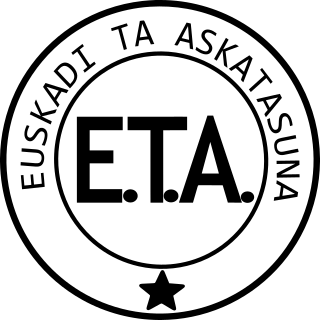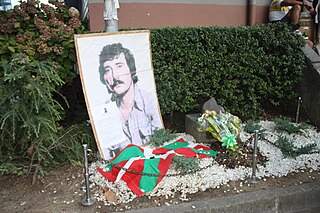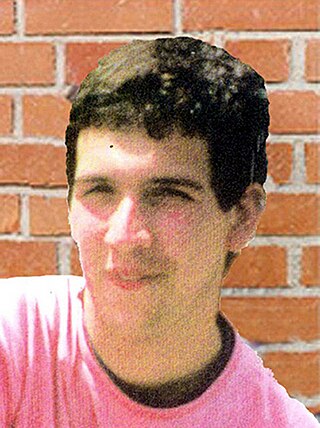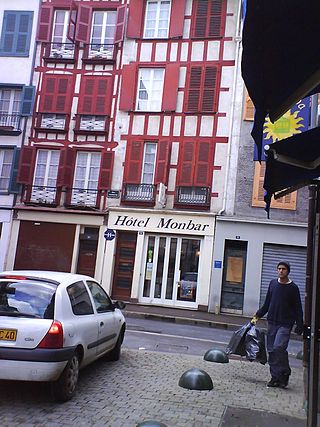Related Research Articles

ETA, an acronym for Euskadi Ta Askatasuna, was an armed Basque nationalist and far left separatist organization in the Basque Country between 1959 and 2018. The group was founded in 1959 and later evolved from a group promoting traditional Basque culture to a paramilitary group engaged in a violent campaign of bombing, assassinations, and kidnappings throughout Spanish territory and especially in the Southern Basque Country. Its goal was gaining independence for the Basque Country. ETA was the main group within the Basque National Liberation Movement and was the most important Basque participant in the Basque conflict.

GAL were death squads illegally established by officials of the Spanish government to fight against ETA, the principal Basque separatist militant group. They were active from 1983 to 1987 under Spanish Socialist Workers' Party (PSOE)-led governments.

On December 30, 2006, a van bomb exploded in the Terminal 4 parking area at the Madrid–Barajas Airport in Spain, killing two and injuring 52. On January 9, 2007, the Basque nationalist and separatist organisation ETA claimed responsibility for the attack. The attack, one of the most powerful carried out by ETA, damaged the airport terminal and destroyed the entire parking structure. The bombing ended a nine-month ceasefire declared by the armed organisation and prompted the government to halt plans for negotiations with the organisation. Despite the attack, ETA claimed that the ceasefire was still in place and regretted the death of civilians. The organisation eventually announced the end of the ceasefire in June 2007.
On 12 April 1985, the El Descanso restaurant in Madrid, Spain was bombed in a terrorist attack. The explosion caused the three-story building to collapse, crashing down on about 200 diners and employees, killing 18 people, all Spanish citizens, and injuring 82 others, including eleven Americans working at the nearby Torrejón Air Base who frequented the restaurant. At the time it was the worst attack in Spain since the Spanish Civil War.
The 2009 Palma Nova bombing occurred on July 30, 2009, when a limpet bomb went off outside a Civil Guard barracks in the town of Palma Nova, Majorca, Spain. The bomb was placed under a patrol car and two Civil Guard officers died as a result of the explosion. A second device was found under another Civil Guard vehicle at nearby barracks and safely exploded by police. On August 9, the Basque nationalist and separatist organisation ETA claimed responsibility for the attack, while four other bombs exploded around restaurants and shopping centres in Palma, Majorca, causing no injuries.

The Hipercor bombing was a car bomb attack by the Basque separatist organisation ETA, which was classified as a terrorist group. It took place on 19 June 1987 at the Hipercor shopping centre on Avinguda Meridiana, Barcelona, Spain. The bombing killed 21 people and injured 45, the deadliest attack in ETA's history. Controversy surrounded the timing of telephone warnings made before the attack and the authorities' response to them.

The Basque conflict, also known as the Spain–ETA conflict, was an armed and political conflict from 1959 to 2011 between Spain and the Basque National Liberation Movement, a group of social and political Basque organizations which sought independence from Spain and France. The movement was built around the separatist organization ETA, which had launched a campaign of attacks against Spanish administrations since 1959. ETA had been proscribed as a terrorist organization by the Spanish, British, French and American authorities at different moments. The conflict took place mostly on Spanish soil, although to a smaller degree it was also present in France, which was primarily used as a safe haven by ETA members. It was the longest running violent conflict in modern Western Europe. It has been sometimes referred to as "Europe's longest war".

The 2008 Getxo bombing occurred on 19 May 2008, when a van bomb went off outside a boat club in the town of Getxo, Biscay in the Basque Country, Spain. The attack caused serious damage to the club, as well as nearby buildings and structures. No one was killed or injured after a warning call from the Basque separatist organisation ETA. On 31 May, the organisation claimed responsibility for the bombing.

Arkaitz Goikoetxea Basabe is a member of the Basque separatist-terrorist organisation ETA. He began his violent activity at the age of 15 as a member of the street violence groups known as kale borroka. He was arrested several times between 2001 and 2002, and joined ETA in 2005.

The Cafetería Rolando bombing was an attack on 13 September 1974 at the Rolando cafe in Calle del Correo, Madrid, Spain which killed 13 people and wounded 71. Though no claim of responsibility was made, the attack is widely believed to have been carried out by the armed Basque separatist group ETA.
The Plaza República Dominicana bombing was a car bomb attack carried out by the armed Basque separatist group ETA in Madrid, Spain on 14 July 1986, which killed 12 people and injured another 32. The dead were all members of the Guardia Civil studying in the nearby traffic school on Príncipe de Vergara. The ETA members later convicted of participation in the attack included significant figures in the group, including Antonio Troitiño and Iñaki de Juana Chaos.
The July 1979 Madrid bombings were a series of bomb attacks carried out by ETA political-military (ETA-pm), a faction of the armed Basque separatist group ETA. The attacks, consisting of coordinated bombings in Barajas Airport and the train stations of Atocha and Chamartín, killed 7 people and injured a further 100. The bombings occurred a day after two attacks in Bilbao and San Sebastian, with both attacks killing two people.
The Mutxamel bombing was an attempted car bombing by the Basque separatist organisation ETA which occurred on 16 September 1991 in the town of Mutxamel near Alicante. The target was the Civil Guard barracks in the town. However the bomb initially failed to explode near its target. The police treated the car as an abandoned vehicle, not realising that it contained a bomb and while being towed away, the car bomb exploded, killing two police officers and the civilian towing the car away. The bombing was the deadliest of the 40 attacks which ETA carried out in the Province of Alicante between 1979 and 2004.
The Vallecas bombing was a car bomb attack carried out by the armed Basque separatist group ETA in the Puente de Vallecas district of Madrid, Spain on 11 December 1995, which killed 6 people and injured a further 19. The target was a camouflaged army vehicle which was transporting nine civilian employees of the army towards the nearby motorway.
The Madrid bombings were car bomb attacks carried out by the armed Basque separatist group ETA in Madrid, Spain on 21 June 1993, which killed 7 people and injured a further 29. The target was an army vehicle transporting members of the army. The dead included four Lieutenant colonels, a Commander, a Sergeant and the civilian driver of the vehicle. This was ETA's deadliest attack of 1993.

The Sabadell bombing was a car bombing carried out by the armed Basque separatist group ETA in Sabadell, Catalonia, Spain on 8 December 1990.

The Monbar Hotel attack was carried out by the Grupos Antiterroristas de Liberación (GAL), a Spanish state-sponsored death squad, on 25 September 1985 in Bayonne, Pyrénées-Atlantiques, France. The targets were four members of the Basque separatist terrorist group Euskadi Ta Askatasuna (ETA), whom the Spanish government believed to be senior figures in the organization, itself proscribed as a terrorist group in Spain and France. All four people were killed, with a fifth person, apparently unconnected to ETA, injured in the shooting. This represented the deadliest attack carried out by the GAL. Although two of the participants were apprehended shortly after the shooting, controversy surrounded the possible involvement of senior figures in the Spanish police.
The Madrid attack was a car bombing carried out by the armed Basque separatist group ETA in Madrid, Spain on 6 February 1992, which killed 5 people and injured a further 7. The target was a military vehicle transporting members of the army. The dead included three captains, a soldier driving the vehicle and a civilian working for the armed forces. This was ETA's deadliest attack of 1992.
On 30 October 2000, the separatist Basque organization ETA detonated a large car bomb on Badajoz Avenue in Madrid, Spain. The blast killed three people; a Spanish Supreme Court judge, Francisco Querol Lombardero, his driver, and his bodyguard. One of the injured, a bus driver, died from his injuries days later. Sixty-four people were wounded. It was the deadliest attack since the ETA called off its ceasefire in December 1999 and one of numerous attacks in Madrid.
References
- ↑ "Car Bomb Injures 99 In Madrid". CBS News. 6 November 2001.
- ↑ "Madrid bomb misses target - police". CNN. 6 November 2001.
- ↑ "ETA timeline: list of attacks by Basque separatist group". The Telegraph. 7 July 2011.
- ↑ "Atentados de ETA desde la ruptura de la última tregua". El Correo Digital (in Spanish). 22 March 2006.